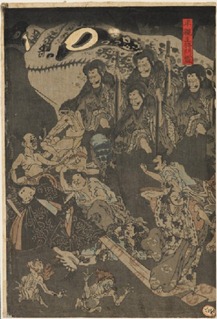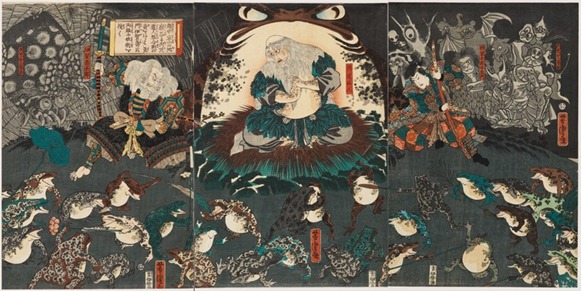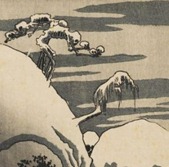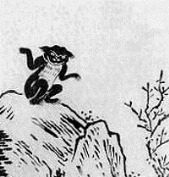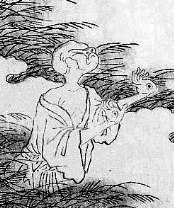I’ve only just discovered a gem of an exhibition, Japanese Ghosts and Demons, which fills but one small room of Oxford’s giant Ashmolean museum. Nevertheless, its seventeen prints contain such a fantastic mix of the grotesque, the cute and the comic that I’ve decided to squeeze the creatures they depict into my list for 2010.
This is an exhibition about obake, which are a diverse group of beings from Japan unified by a single characteristic: they are all transformative, beings who have broken the laws of constancy to shift or metamorphose into something else. The Japanese culture and language magazine, Mangajin, carries an engaging article about obake on its website which, despite being unrelated to this exhibition and written several years ago, could comfortably appear alongside the prints in the gallery. I’d also strongly recommend the section of it which touches on foxes.
The Mangajin article’s author, Tim Screech (professor of Japanese Art History at the University of London), explains obake far better than I ever could.
Obake, the Japanese “ghost,” is exactly what its name suggests: o is an honorific prefix, while bake is a noun from bakeru, the verb meaning “undergo change.” Japanese ghosts, then, are essentially transformations. They are one sort of thing that mutates into another, one phenomenon that experiences shift and alteration, one meaning that becomes unstuck and twisted into something else. Obake undermine the certainties of life as we usually understand it.
You might have guessed that I find transformations and metamorphoses endlessly fascinating. My favourite one on show in the Ashmolean exhibition can be seen in the wonderfully titled Nikushi the Frog Spirit Conjures up a Magical Battle of Frogs at Tateyama in Etch? Province. The fighting frogs in question are stones transformed by Nikushi into battle-hardened amphibeans, armed to the teeth with bulrushes and lily stalks.
Clicking either of the above images will take you to the relevant pages of the Ashmolean’s site, where you can zoom in and explore the rest of the prints in the exhibition to your heart’s content. This link will take you to the exhibition’s contents page. There is much to admire, but make sure you don’t miss a landscape haunted by the ghosts of a warlord’s victims.
If you like the look of all this, then there are more obake haunting the Internet. Wikipedia has some digitised illustrations from the 1776 bestiary Gazu Hyakki Yak?, or The Illustrated Night Parade of A Hundred Demons. This was Toriyama Sekien’s definitive catalogue of obake and other wondrous creatures. Here’s a close-up of the Yamabiko, an echo monster from the mountains.
And here’s the Tenome, an obake with eyes in its hands. It reminds me of the second scariest monster from Guillermo Del Toro’s astounding Pan’s Labyrinth, the Pale Man.
I’m sure some of the creatures from Gazu Hyakki Yak? will be reappearing on the blog in the New Year. To coincide with the release of the US paperback, January’s blog posts are going to be devoted to The Girl with Glass Feet, but come February I hope to begin a new project on this site: a bestiary of my very own. It’ll be a tribute of sorts to Jorge Luis Borges’ Book of Imaginary Beings along with, I hope, all of the multimedia razzmatazz that the internet offers. But more of that in 2011. Until then, watch out for obake under your bed tonight…
